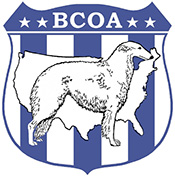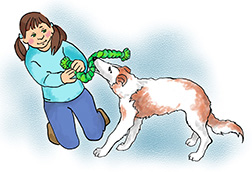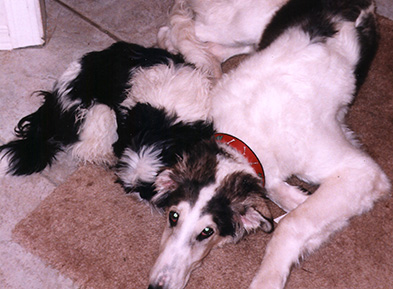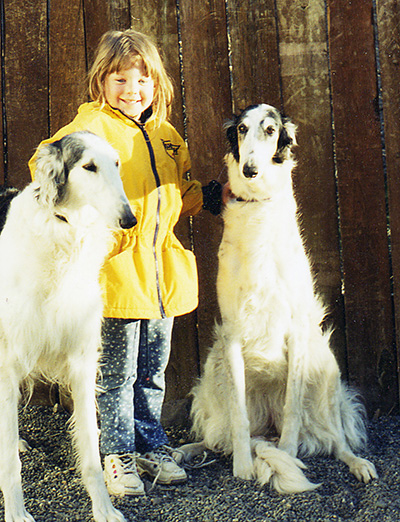
![[ Random Borzoi Image ]](../bannerpicsrandom/image-67.jpg)

![[ Random Borzoi Image ]](../bannerpicsrandom/image-67.jpg)

This page is intended to answer some of the questions that you may have about owning a Borzoi. The Borzoi is a noble breed with a long history. The breed originated in Russia and was used to hunt wolf, fox and hare. They were associated to the Russian aristocracy and in turn favorites of their relative, the English nobility.
Borzoi are considered a giant breed with an average height at the wither (top of shoulder) of 28" to 32" and an average weight of 60 to 100 pounds. Even though they are large dogs they are graceful animals and with proper training make excellent house dogs. They do require exercise. This can be accomplished by running in a safe, fenced yard and/or by daily walking on a lead. It is NEVER advisable to allow a Borzoi to run loose, especially near busy roads or streets.
They are an intelligent breed but are independent and can be stubborn. Borzoi are affectionate dogs, especially with their own families. Like most dogs, Borzoi adapt well to a daily schedule of adequate feeding and exercise. Some basic obedience training and socialization are recommended. Patience and consistency are the key to realizing the full potential of your Borzoi.
It is our hope that you will consider the information contained this pamphlet and decide whether the Borzoi is the right dog for you.
Why do you want a Borzoi? It is because of their beauty? Their elegance? Their running ability? Their impressive size and appearance?
You need to decide why you want a Borzoi as this is not a breed that will fit into every household. In addition, you need to ask yourself if you are ready to accept the responsibilities of owning a Borzoi. Many things need to be considered before getting your Borzoi. Do you have the facilities to properly house and exercise the Borzoi? Do you have the financial resources for the proper maintenance (food, veterinary care, boarding, etc.) for your Borzoi? Are you prepared to make a long term commitment to your Borzoi for the duration of its life?
If after careful thought and complete honesty you have decided that the Borzoi is the breed for you, then you need to decide whether you want a puppy or an older dog.
Many people want a puppy so that they can train the puppy the way they want. This can be very rewarding, but it can also be time consuming and frustrating. An older dog has already gone through the less endearing stages of puppyhood (housebreaking, teething, digging, leashbreaking, etc.) and this appeals to some people who may not have the time or the patience that is needed for proper puppy training. If the older dog has been properly trained and socialized during its early months and then given the proper attention and understanding by you and some time to adjust, an adult Borzoi usually adapts quite well to an new environment and makes a wonderful companion.
After deciding what you want, you should look around before getting your Borzoi. NEVER GET OVER-EAGER.
The pet shop is not a good place to get your Borzoi. Most of the dogs there come from "puppy mills." A "puppy mill" is like a breeding farm that is only concerned with producing puppies for the marketplace. Little concern is given to the quality, socialization, care and in some cases, even the health of the animals. "Backyard breeders" are another source to be avoided for many of the same reasons as "puppy mills." Try to located a dedicated "hobby breeder." This breeder can provide a wealth of knowledge, information and help. The "hobby breeder" has spent many hours, indeed may years in some cases, determining which dog should be bred to which bitch to produce puppies of sound physical and mental health and condition. A "hobby breeder" breeds a litter only when he/she knows that he/she can spend the optimum amount of time with each puppy in so far as training and socialization is concerned. Don't be surprised if this type of breeder expects you to live up to the same standards with your new puppy.
If there are any local dog shows in your area you may want to attend one or several of them. At the shows you can look at the Borzoi being exhibited there and talk to their owners. This may help you find out who the "hobby breeders" are in your area. If this is not possible, you can always contact someone in a local all-breed kennel club and ask them about finding good "hobby breeders."
Make a list of the breeders and contact them to see what Borzoi they have available now or what their plans may be for breeding any of their stock in the future. Dogs in general and Borzoi specifically should not be something that you buy on an impulse. It may be better to wait for a litter from a breeder that you respect and whose Borzoi you like. Do not rush out and acquire a dog that you might later regret having purchased. Try and visit the breeders and see their Borzoi. When you visit a breeder and see their Borzoi, look at the conditions of their dogs. Do they appear healthy? Are they friendly? Are their facilities clean? If possible look at the parent(s) of the puppy or dog and as many of their offspring and relatives that the breeder may have. Take time to talk to the breeder and ask questions. Most breeders are glad to spend time with a prospective owner answering questions and offering guidance and advice. If the breeder seems more interested in just getting your money and getting rid of you, and one of his/her dogs, then this is not a breeder who has the best interests of you or the breed at heart.
Another possibility for acquiring a Borzoi is to find out if there is a local Borzoi club or group in your area. These groups often do rescue work. Sometimes Borzoi, both puppy and adult, wind up in an unfortunate situation through no fault of their own. Changes in life-style, economic circumstances or impulse buying constitute some of the reasons resulting in unwanted Borzoi. These animals, if they are adults, may already be spayed or neutered. If there are no rescue group in your area then check the local animal shelters and pounds. Also check the Borzoi Club of America Borzoi Rescue page.
How long do Borzoi live? A dog in good health and given proper care can live to be 9 or 10 years old although many live to be 12 to 14 years old.
Are Borzoi difficult to raise? No, but proper care, exercise, good food and necessary veterinary care and grooming are essential.
How much do Borzoi eat? Borzoi are surprisingly small eaters for a giant breed. Puppies consume more food than adults due to their rapid growth. On the whole, an adult Borzoi will eat about the same amount of food as an adult Shepherd or Setter. The quality of the food is of primary importance. In general, strenuous exercise is not recommended before or after feeding time.
How much do Borzoi shed? All long coated dogs will shed and Borzoi are no exception. Females will shed after a season and males will shed annually. If spayed, females will shed the same as males. Regular grooming every day or so will remove any loose hair and dirt from the coat. Bathing is needed but not as frequently as in some other breeds.
Are Borzoi good with other animals?

Yes, if they are raised around these animals. Remember, Borzoi were bred to chase and catch game; any small animal that runs may trigger this response. (This is especially true with cats. Keep in mind that your Borzoi may be just fine with your indoor cat(s) but may change his attitude dramatically outdoors when a cat, even his indoor cat, runs from him.)
Are Borzoi good with children?

When raised with children, most Borzoi are good companions, but they are not a breed that will tolerate the rough treatment that a young child can sometimes inflict. Children should be taught how to properly behave with and handle a Borzoi. Remember the size of the Borzoi. A very small child could be easily injured if accidentally knocked down by a Borzoi. If a child plays roughly with a young dog, the dog sometimes will respond by playing rough with the child. For these reasons, small children should always be supervised when around a Borzoi.
How destructive are Borzoi?

Borzoi are puppies for a long time so the destructive tendencies of puppyhood are there for a long time in a very large puppy. Training and temperament of the individual Borzoi and its bloodline are factors. Boredom can be the cause for some destructive behavior. Attention and exercise can often help alleviate the problem; however, if the dog is to be left alone for long periods of time, you should consider having a kennel run built outdoors or providing a crate inside for your Borzoi. In fact, most Borzoi grow to love their crate and regard it as their special home, even with the door left open. Crates are humane and take advantage of the dog's natural den instincts. An ideal size crate for an adult Borzoi is 26" wide by 36" high by 48 "long. A dog secure in a crate must be able to stand, turn around and lie down in an uncramped position.
Are there any special health problems in Borzoi? In general, Borzoi tend to be remarkably healthy dogs. But as with many of the large breeds, including Borzoi, there are some problems that can be found. These include the following, all of which should be discussed with your veterinarian so that you are aware of the symptoms:
Bloat and Torsion. Bloat is a condition where for some reason the stomach swells or fills up with gas, fluid or both. Torsion occurs when the stomach rotates and twists itself closed. IMMEDIATE VETERINARY CARE IS ESSENTIAL FOR THIS CONDITION.
Dysplasia of both the hips and the shoulders can be found in Borzoi, although it is not common.
OCD (Osteochondritis Dissecans) and PRA (Progressive Retinal Atrophy) are occasionally found in the breed.
Like all of the other sighthounds, Borzoi are more sensitive to anesthesia than other dogs. It's a good idea to mention this tendency to your veterinarian.
What makes a better companion, a male or a female Borzoi? This is really a question of personal preference. Males are larger than females and in most case have more impressive coat. Gender does not seem to play a large factor with regard to raining, temperament or adaptability.
This publication covers many questions that the first time owner/buyer may have about purchasing a puppy and what to expect from the breeder. Also available from the Borzoi Club of America are the pamphlets Showing Borzoi In Conformation that has a good section on grooming, Borzoi In Obedience, Borzoi In Agility, Lure Coursing With Borzoi and the Visualization Of the Borzoi Standard. The Borzoi Club of America publishes Yearbooks containing pictures and pedigrees.
All About Borzoi - The Borzoi Club of Northern California, Inc. - 1968.
Borzoi - Winifred Chadwick, Kingsprint Limited - 1971 and 1977.
How To Raise and Train A Borzoi - Gail Roberts, TFH Publishing - 1964.
Hutchinson On Sighthounds - Walter Hutchinson, Hoflin - 1976 - reprint.
Life With Borzoi - Phydelma Gillette, Hoflin - 1977.
Observations on Borzoi - Joseph B. Thomas, Hoflin - 1976 - Reprint.
Riders of the Wind - Mary Tavener, Reprinted by Riders of the Wind.
The Complete Borzoi - Lorraine Groshans, Howell Book House - 1981.
The Borzoi - The Borzoi Club of America, Inc - 1973.
The Borzoi - John Gordon, ARCO - 1974.
The Borzoi - Stedman Chumway Hanks, Hoflin, 1977 - Reprint.
The Borzoi As I Know It - Arthur Craven, Hoflin - 1977 - Reprint.
The Life and Legends of the Borzoi - Eileen Worthing, Hoflin - 1977.
The Russian Wolfhound - Nellie L. Martn, Hoflin - 1977 - Reprint.
Your Borzoi - Alfred W. Edlin, M.D., Denlinger - 1976.
Unfortunately, many of these books are out of print and you many have difficulty locating them. Those noted as reprints many possibly still be available.